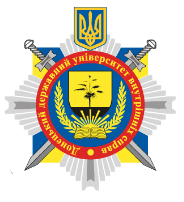HUMANITARIAN TRAINING OF SPECIALISTS IN HIGHER EDUCATION INSTITUTIONS WITH SPECIFIC LEARNING CONDITIONS
DOI:
https://doi.org/10.32782/2709-9261-2025-1-13-13Keywords:
humanitarian education, professional training of police officers, language component of education, institutions with specific learning conditionsAbstract
Modern education aims not only to train highly qualified specialists in specific fields but also to develop well-rounded individuals. The humanitarian aspect of professional formation plays a critical role in shaping social, moral, and ethical values, which are essential for both professional and personal fulfillment. This is particularly important in law enforcement, where officers must adhere to the principle of the rule of law, recognizing the rights and freedoms of individuals as the highest values guiding state activities. Higher education provides an essential foundation for acquiring the knowledge and skills necessary to become a professional in any field, with critical thinking, worldview formation, and value orientations as core outcomes. Humanitarian education fosters the development of moral-ethical standards, crucial for professionals working with people, such as police officers, who make decisions directly impacting lives.Language competence is an integral part of law enforcement training, as effective communication skills and proper use of language are key to their work. Law enforcement officers regularly interact with citizens, witnesses, and colleagues, as well as handle legal documentation, making language proficiency essential for both oral and written communication.Mistakes or inaccuracies in speech or writing can lead to legal consequences, potentially violating citizens’ rights.Moreover, clear and precise communication is crucial in resolving conflicts and preventing offenses. Officers must master persuasive language for negotiations and mediation, ensuring trust and cooperation with the public.Language training also includes the development of professional ethics in communication. Law enforcement officers must adhere to formal language standards, avoiding inappropriate or offensive language that could undermine public trust. The ability to engage positively with the community enhances the image of law enforcement, promoting mutual respect and cooperation between law enforcement agencies and society.
References
1. Поліцейська діяльність : підручник / С.С. Вітвіцький та ін. ; за заг. ред. проф. С.С. Вітвіцького. Київ : ВД Дакор, 2021. 372 с.
2. Мошенський О.С. Про необхідність посилення гуманітарної складової в підготовці поліцейських у вищих навчальних закладах МВС України. URL: https://univd.edu.ua/general/publishing/konf/24_05_2018/pdf/51.pdf (дата звернення: 17.02.2025).
3. Деканоідзе Х., Хелашвілі М. Системи освіти та підготовки поліції в регіоні ОБСЄ. Київ, 2018. 164 с.
4. Крижановська О. В. Ціннісно-компетентнісний підхід у навчанні для формування професійної компетентності майбутніх поліцейських. URL: https://univd.edu.ua/general/publishing/konf/24_05_2018/pdf/49.pdf (дата звернення: 15.02.2024).
5. Про Національну поліцію : Закон України від 02.07.2015 р. № 580-VIII. Відомості Верховної Ради. 2015. № 40–41. Ст. 379.
6. Гуманітарна політика в Україні: виклики та перспективи (Біла книга): аналіт. доп. / О.О. Сінайко (кер. авт. кол.) та ін. ; за заг. ред. Ю.Б. Каплан, Ю.А. Тищенко. Київ : НІСД, 2020. 136 с.
7. Яворська Г.Х. Педагогіка для правників : навч. посібник. Київ : Знання, 2004. 335 с.
8. Голодник Ю.М. Професійна підготовка правоохоронців як одна із найважливіших функцій держави. URL: http://journal-app.uzhnu.edu.ua/article/view/284720 (дата звернення: 13.01.2025).
9. Огарєнко Т.А. Комунікативна компетентність як складова загальної культури працівника правоохоронних органів. Українська поліцеїстика: теорія, законодавство, практика. 2024. № 1 (9). С. 44–47.





